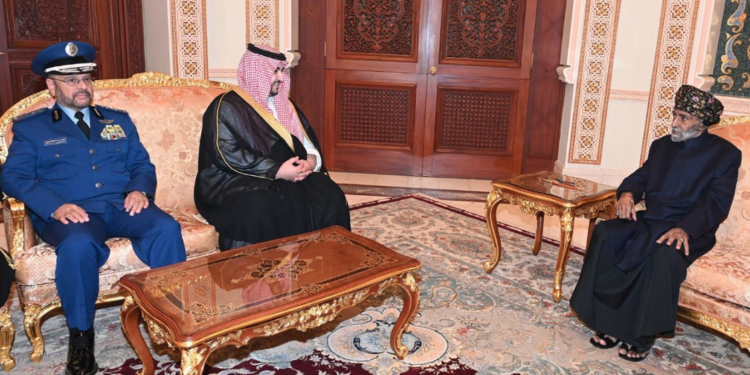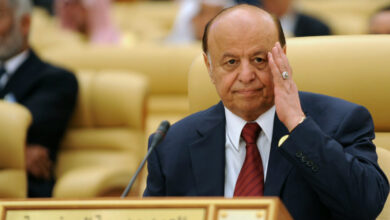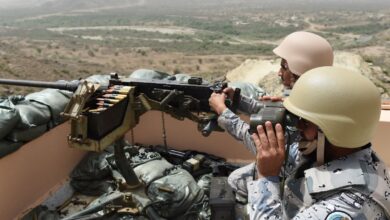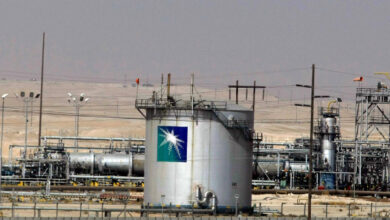The Saudi regime talks with the Houthis through Muscat

Saudi Deputy Defense Minister Khaled bin Salman’s visit to Oman on Monday was considered the focus of Yemeni political circles, where government sources described it as the “godfather of the Riyadh agreement” and took over Yemen’s responsibility in his government for months.
It seems that the wheel of the political efforts of the Saudi regime in the Yemeni file has moved, this time, from the gateway of Oman, the eastern neighbor of Yemen, and the mediator known since the escalation of the war in 2019, between the international community and the group Houthis, in light of the decline he pointed out the frequency of confrontations and air strikes of the coalition, and in light of the crisis raised by the presence of the Saudi regime in the Yemeni province of Al-Mahra with the Omanis.
Khalid bin Salman held meetings in Muscat with Sultan Qaboos bin Said, Oman’s Defense Minister Bader Al Borsaidi and other officials.
While neither the Saudi nor Omani side has announced more details about what the talks discussed, it was clear that the Yemeni file was at the center of the agenda of the visit, whether in the presence of Khalid bin Salman or among the members of his delegation, which also included the Saudi ambassador to Yemen, Mohammed Al Jaber.
The visit came in conjunction with leaks raised over an ongoing dialogue between the Houthis, whose negotiating delegation, led by the group’s spokesperson, Mohammed Abdulsalam, has been in Muscat for many months and between the Saudi; and over the past years, the Sultanate has been the gateway to international diplomatic efforts with the Houthis. In November 2016, for example, I witnessed a famous meeting between the group’s delegation and former US Secretary of State John Kerry, as well as a series of often undeclared diplomatic and semi-security meetings that the Saudis did not miss.
The development coincided with a decline in the intensity of border confrontations and air operations carried out by coalition aircraft, after it has largely stopped, on a number of provinces, since the Houthis announced on September 20, to stop their attacks against the Kingdom, a declaration that Riyadh met as a positive step, but this welcome did not amount to a response to the conditions received from the Houthis, to continue their cessation of operations, and is a similar cessation of coalition operations.
On the other hand, Muscat, for the Saudis at least, does not lead directly to talks about negotiations with the Houthis, as it relates to the situation in Yemen’s Mahra province, which the Omanis consider part of their national security, while Saudi Arabia has strengthened its military presence in the country. The province faced strong local opposition from personalities, some of whom were to blame for Muscat.
According to the local opposition in the skilled Saudi presence, Riyadh is seeking to extend an oil pipeline, through the province, for export to the Arabian Sea, and began to strengthen its influence for nearly two years, which represented a worrying development for Muscat, and turned the crisis in the province, in the eyes of some observers, To a proxy conflict between Riyadh and Muscat.
Riyadh faced strong local opposition in Al-Mahra, the most recent development of which was in October, with the announcement of the establishment of the Southern Salvation Council, a political body in which many prominent figures opposed to the presence of the Saudi family in Al-Mahra, its residents have positive relations with Muscat, due to the border location and the role Oman plays in supporting the governorate at the development level, even at the level of facilities provided to the population.
In recent weeks, Khalid bin Salman has emerged as the “Godfather of the Riyadh Agreement” and is directly responsible for various political efforts his country has made to contain the crisis between the Yemeni government and the UAE’s allies, including the arrangements that preceded the agreement, including the withdrawal of Emirati forces from the city. Aden, and its handover to Saudi and Yemeni forces, has been a success amid past torrent failures over the past years, but that success remains contingent on the challenges of implementation on the ground.





